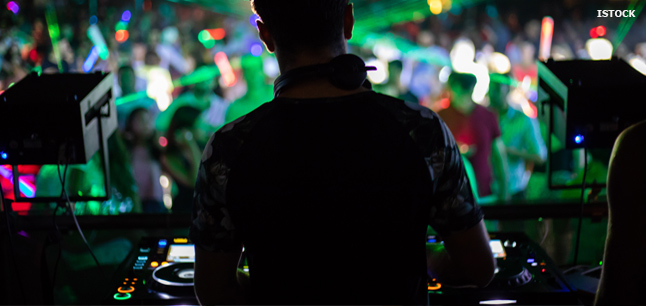
If you think that Daft Punk, Avicii, or Martin Garrix are good deejays, well chances are you don’t know what a good deejay is, because contrary to popular belief, these electronic music celebrities, strictly speaking, are not deejays. Okay, maybe I’m overdoing it a bit, but let me explain the deejay profession to you and you can judge for yourself whether these celebrities are good deejays or just aren’t.

This article is absolutely not written with the aim of “breaking eggs” on the backs of others, but rather with the objective of doting the “i’s” and finally putting an end to these illusions that marketing the music industry and its equipment spills over into your head.
I am writing this article with the primary aim of making you understand what the job of a dj really is and to distinguish it from that of the producer, author, and composer of music. I do this so that you can identify what really motivates you and to be able to draw a profile that suits you.
And I know what I’m talking about, having started with amateur deejaying first, I got more and more interested in the studio mixing and Computer-Aided Music. I started my first productions and I forced myself to do the evening deejay in the idea that in this way I could make myself known and finally reveal my music.
THIS TYPE OF COURSE IS A MYTH THAT YOU MUST STOP BELIEVING IF AT THE BASIS WE DON’T LIKE DEEJAYING !!!
- If it’s the composition that interests you, make the composition and don’t get confused with the deejaying!
- If it is the deejaying that interests you, stop believing that it is the composition that will allow you to succeed, it is completely wrong!
- If you are interested in both and do both well, but remember that Dj and songwriter are two totally different things.
FROM DISC-JOCKEY TO DEEJAY
Whether you like it or not the first role of the disc jockey (deejay, DJ) is as the name suggests, ” TO ENCHAIN DISCS” . This means that the primary role is not to make people dance as we can often hear, but to string together records. Because a deejay can very well be paid to string together records in a fashion show or during the presentation of a new model of car and therefore, is not paid to make people dance but to ” PLAY MUSIC WITHOUT INTERRUPTION” during an event. Indeed, I grant you, we are more used to seeing deejays in a discotheque, that said, that was not always the case and we have to go back in time to understand why deejays have primarily found their place in this type of place.
At the outset, the dancing establishments, the “Night Clubs” as they say, called on real music groups to ANIMATE an evening or an event. Over time, recording and sound reproduction technologies in the 1950s gave birth to the “LP record”, commonly known as ” vinyl record “. This one, in the space of 10 years became of such good quality that it was no longer necessary to call upon a group of musicians to reproduce a music. And that’s how the first music fans quite naturally began to collect tens and hundreds of vinyl records to string them together at private parties and become “
During the same period, the “Night clubs” understood that they could also collect hundreds of music and distribute them without having to call on musicians. Consequently, in the interests of profitability, nightclubs have gradually replaced music groups, musicians, by a single employee whose function was to make the “Disc Jockey”.
You will have probably understood it, the deejays, have between quotation marks, “stung” a part of the work of the musicians.
But things don’t end there. Although the DJs of the day could easily replace a band when it came to music delivery, things were quite different when it came to setting the mood. A music group certainly makes music but also performs on stage. A band takes the stage, a band puts on a show and that’s where the deejays were and often still are. This is why to fill this void, the deejays have become secondly ANIMATORS.
Thus, the role of the Disc-Jockey has grown to that of ANIMATOR.
And it is thanks to this point that the profession of deejay has been able to find recognition among an audience. Because the deejay no longer had the simple role of playing records according to a musical program defined by an artistic director and/or a musical programmer but had to do it well, listen and adapt to the reactions of the public.
Thus, the deejay, to adapt to the public, had in addition to having a good musical culture, to keep abreast of the latest news. This is why it must be attentive to the different fashions and be on the lookout for new emerging artists.
In a short time, the deejay has taken such an important place in dance establishments and radio stations that it has become a benchmark in terms of talent scouting.
This is why the record companies and producers have naturally approached the DJ to offer them to play their title by means of “arrangements” financial or “in-kind” …
“If you pass up that title, I’ll give you that … or you can meet him or her …”
These arrangements have gradually transformed some popular deejays into artist-producing deejays. Because having the power to distribute unknown music to an audience, it has the power to make artists known. And consequently, the power to produce artists takes too much risk since it can directly test the “capacity of appreciation” of a title towards an audience.
But this is another story that goes beyond the framework of conventional deejay and begins that of some producers of current music. History which will give birth in the years 2000 to the phenomenon of ” DJ Star “
DEEJAY’S JOB CONSISTS OF:
1) Chain music.
2) Animate an audience.
3) Listen and adapt to the reactions, tastes, and desires of the public.
4) Be on the lookout for new trends and emerging artists.
A good DJ does not impose his musical tastes.
A good DJ must follow the tastes of the public to the detriment of his own.
A good DJ is distinguished by his ability to understand and give an audience, the atmosphere, and the music that this audience wants.
Remember that in a nightclub, it is the public who come to the party and not the DJ, nor all the people who work in the establishment. A good DJ in a nightclub creates a festive atmosphere because it is the public who asks him! It is not the dj who asks the audience to dance. It is the public who asks the DJ to put on some music to dance!
This also means that an audience can ask a dj for something other than dancing.
The public in a “lounge” establishment does not ask a DJ to play music to dance, but music to relax.
It’s the DJ who has to adapt, not the audience!
- Having said that, the audience isn’t the only one in deciding what to do with a dj, because in reality, it’s the customer.
The DJ provides a service to a client and that client can be something other than an audience.
In a nightclub, the “end customer” is the public, but the direct customer is the nightclub that calls on the services of the dj.
This means that a direct customer can ask the dj not to adapt to the end customer, for example, to impose a brand image.
This can be the case for a fashion show. The creator of the show requests the services of a deejay and therefore becomes his client (or his employer depending on the type of contract, but this is a detail that does not change the logic at all). This creator asks the dj for a certain sound dressing, a certain selection of music that the creator judges to be in adequacy with his parade. In this case, even if the public prefers Hip Hop music, if the creator has chosen Electro music, the DJ will follow the indications of the creator who pays him.



